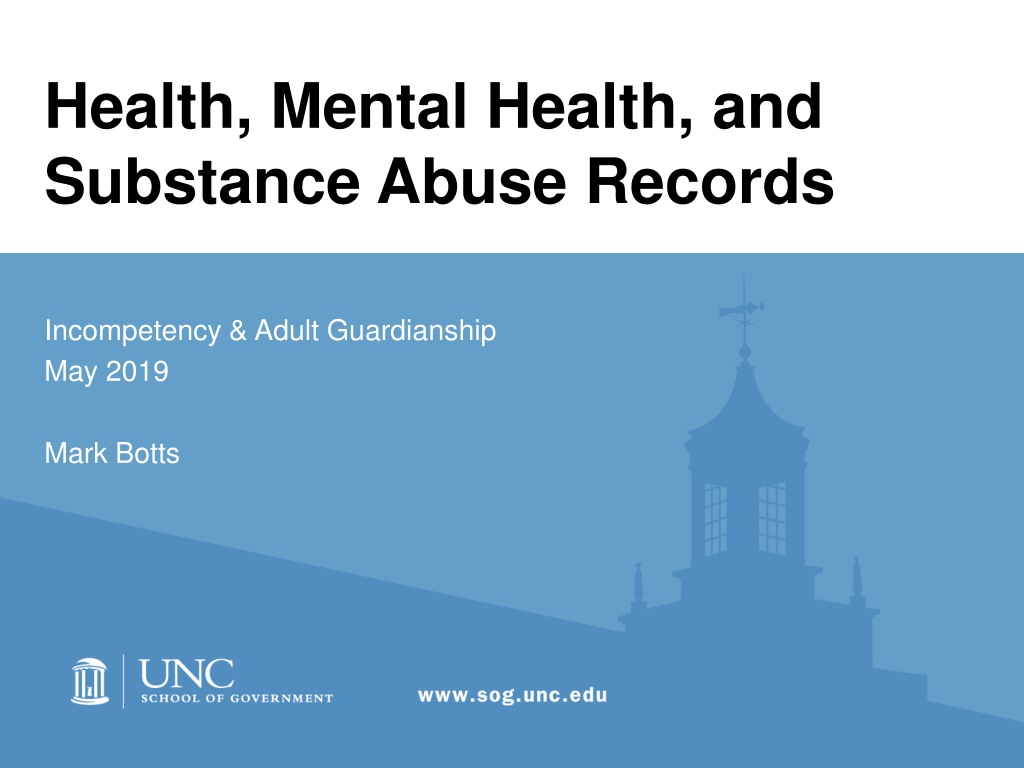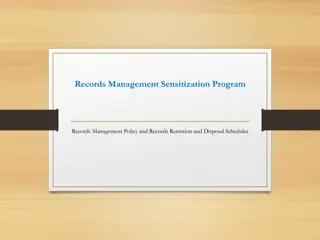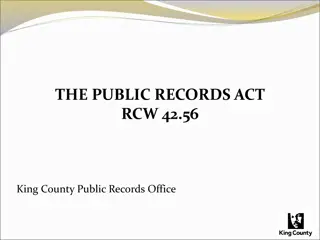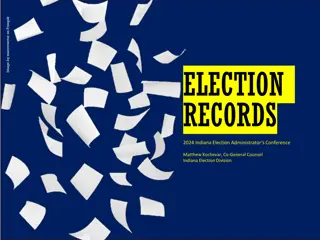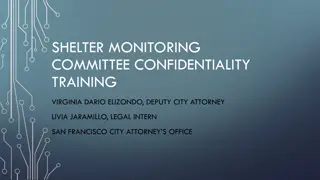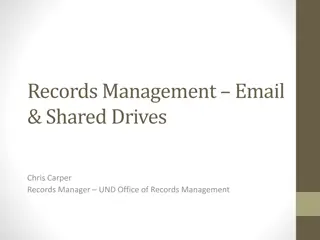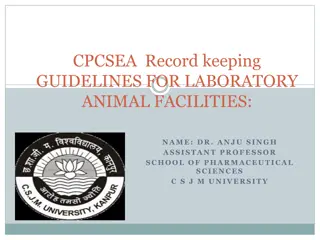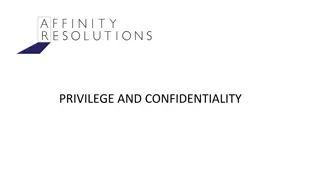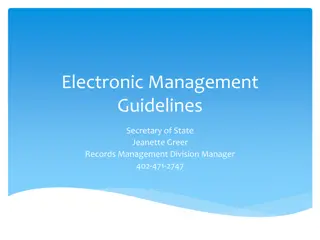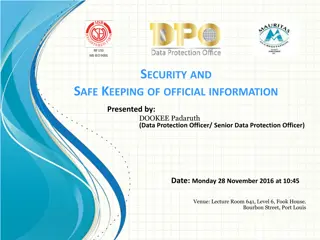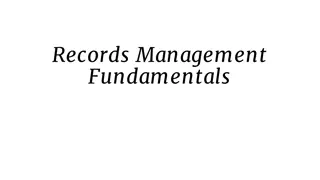Understanding Health Records Confidentiality and Legal Protections
Health records, including mental health and substance abuse records, are confidential and protected under laws such as HIPAA and state regulations. Healthcare professionals require legal authorization to disclose such information, ensuring patient privacy and upholding confidentiality duties. The duty of confidentiality extends to both treatment providers and recipients of sensitive information, safeguarding individuals' health data.
Download Presentation

Please find below an Image/Link to download the presentation.
The content on the website is provided AS IS for your information and personal use only. It may not be sold, licensed, or shared on other websites without obtaining consent from the author. Download presentation by click this link. If you encounter any issues during the download, it is possible that the publisher has removed the file from their server.
E N D
Presentation Transcript
Health, Mental Health, and Substance Abuse Records Incompetency & Adult Guardianship May 2019 Mark Botts
Healthcare professional perspective on medical records Healthcare information is confidential Protected under HIPAA Privileged under state law Some information has additional protection Mental illness Intellectual or developmental disability Substance use disorder Communicable disease
Law HIPAA privacy rule (federal) Information covered Protected health information (PHI) Information that identifies an individual and pertains to: Health status or condition, or Provision of health care, or Payment for provision of health care. 45 C.F.R. 160 Privileges (state) Privileged information Info tied to a professional treatment relationship recognized by statute. Physician-patient, nurse-patient, social worker-client, counselor-client, psychologist-client, etc. G.S. 8-53 thru 8- 53.13. Communicable disease (state) G.S. 130A-143 Confidential information Information that identifies someone who has or may have a reportable communicable disease
Law Information covered MH/DD/SA (state) Confidential information Information that identifies an individual as receiving services from a provider of : Mental health, Developmental disabilities, or Substance abuse services Confidential information Information received by a substance abuse treatment program that identifies an individual as a recipient of alcohol or drug abuse services, or an indiividual who abuses alcohol or drugs G.S. 122C-51 thru -56. Substance use disorder records (federal) 42 C.F.R. Part 2
Healthcare professional perspective on medical records To legally disclose information, they need either a Law Patient authorization, or Court order that, under the particular circumstances, permits or requires disclosure
Duty of Confidentiality Applies to the patient s treatment provider Applies whether the information is recorded or not whether conveyed in writing or verbally Under some laws, the duty extends to those who receive information from treatment providers Information governed by the state mental health confidentiality law G.S. 122C Information governed by the federal substance use records law 42 C.F.R. 2
Three Ways to Get Information 1. Court order or other legal process that compels disclosure 2. Patient or personal representative gives provider written authorization to disclose 3. Patient obtains information or record and provides it
1. Court Order All 5 laws discussed in this session authorize disclosure pursuant to a court order Most laws HIPAA, state MH/DD/SA, communicable disease do not set forth any particular legal standard or criteria for determining whether to issue the order. Generally, you should balance the public s interest in disclosure that truth be known and justice be done with the individual s interest in privacy
The Public Interest Test relevant necessary privacy interests public interests
Is the Information Relevant? What are the questions before you? Can respondent manage her own affairs? Can respondent make or communicate important decisions concerning his person, family, or property? What is the nature or extent of the needed guardianship? Will the information help answer these questions?
Is the Information Necessary? Is the information necessary? Do you need it to understand or decide an issue that is essential to adjudicating the case? Or, does the information speak to a question that has already been answered? Or, are there other ways of getting the information?
In re E.P., M.P. 183 N.C. App. 301, 645 S.E.2d 772 (2007) SUD records of parents were not relevant during the adjudication stage of neglect and dependency proceeding. County DSS had sufficient evidence of mother and father's substance abuse without including their substance abuse records, and nothing indicated that the records would provide additional evidence regarding the neglect and dependency of the children.
Privileged information A judge may compel disclosure of privileged information if, in the court's opinion, disclosure is necessary to the proper administration of justice What about the clerk? If the case is in district court the judge shall be a district court judge, and if the case is in superior court the judge shall be a superior court judge.
Federal Substance Abuse Law Any judicial review of records including any hearing or oral argument on the disclosure question must be incamera Court must find good cause for disclosure Other ways of obtaining the information are not available or would not be effective The public interest and need for the disclosure outweigh the potential injury to the patient, the physician-patient privilege, and the treatment services
Federal Substance Abuse Law Court must limit disclosure to: Those parts of the record that are essential to fulfilling the objective of the order Those persons whose need for the information forms the basis for the order
Communicable Disease Info Applies to information about a person who has or may have a reportable communicable disease or condition Patient or personal representative may request in camera review Close hearing? In the trial, the trial judge may, during the taking of testimony concerning such information, exclude from the courtroom all persons except the officers of the court, the parties and those engaged in the trial
Summary Findings Information is relevant Information is necessary To proper administration of justice Other ways of obtaining information are not available or effective The public interest and need for the disclosure so that truth be known and justice done outweigh the potential injury to the patient s privacy interests [the physician- patient privilege, and the treatment services]
Court Order Checklist Basic requirements: Who is being ordered to disclose? What information? To whom? Have you identified the applicable confidentiality laws? Do you make the findings required by law or otherwise apply a standard for disclosure? Do you limit your order to those parts of the record that are essential to fulfilling the order s objectives? Do you the limit disclosure to those persons whose need for the information forms the basis of the order?
2. Written Authorization HIPAA: Required elements and statements Other laws: Additional elements Form: Providers create forms to meet the particular requirments that govern them.
3. Patient-obtained Info Patient generally has right of access to own records/ information (rare exceptions) Confidentiality laws do not prohibit or otherwise regulate a patient s self- disclosures
Questions? Mark Botts 919.962.8204 botts@sog.unc.edu
